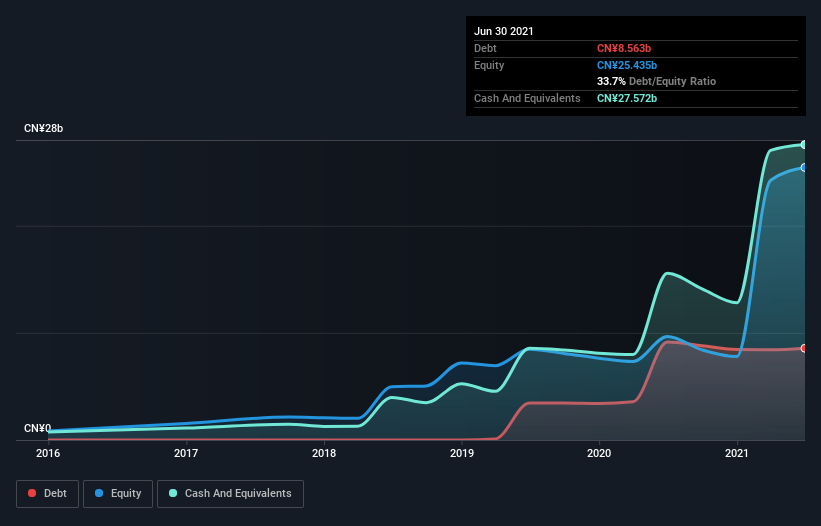Howard Marks put it nicely when he said that, rather than worrying about share price volatility, 'The possibility of permanent loss is the risk I worry about... and every practical investor I know worries about.' So it might be obvious that you need to consider debt, when you think about how risky any given stock is, because too much debt can sink a company. As with many other companies Bilibili Inc. (NASDAQ:BILI) makes use of debt. But the real question is whether this debt is making the company risky.
When Is Debt Dangerous?
Debt and other liabilities become risky for a business when it cannot easily fulfill those obligations, either with free cash flow or by raising capital at an attractive price. In the worst case scenario, a company can go bankrupt if it cannot pay its creditors. However, a more usual (but still expensive) situation is where a company must dilute shareholders at a cheap share price simply to get debt under control. By replacing dilution, though, debt can be an extremely good tool for businesses that need capital to invest in growth at high rates of return. When we examine debt levels, we first consider both cash and debt levels, together.
What Is Bilibili's Debt?
The image below, which you can click on for greater detail, shows that Bilibili had debt of CN¥8.56b at the end of June 2021, a reduction from CN¥9.14b over a year. But it also has CN¥27.6b in cash to offset that, meaning it has CN¥19.0b net cash.

How Healthy Is Bilibili's Balance Sheet?
We can see from the most recent balance sheet that Bilibili had liabilities of CN¥9.40b falling due within a year, and liabilities of CN¥8.46b due beyond that. Offsetting these obligations, it had cash of CN¥27.6b as well as receivables valued at CN¥1.38b due within 12 months. So it actually has CN¥11.1b more liquid assets than total liabilities.
This surplus suggests that Bilibili has a conservative balance sheet, and could probably eliminate its debt without much difficulty. Succinctly put, Bilibili boasts net cash, so it's fair to say it does not have a heavy debt load! When analysing debt levels, the balance sheet is the obvious place to start. But it is future earnings, more than anything, that will determine Bilibili's ability to maintain a healthy balance sheet going forward. So if you're focused on the future you can check out this free report showing analyst profit forecasts.
In the last year Bilibili wasn't profitable at an EBIT level, but managed to grow its revenue by 76%, to CN¥15b. With any luck the company will be able to grow its way to profitability.
So How Risky Is Bilibili?
We have no doubt that loss making companies are, in general, riskier than profitable ones. And we do note that Bilibili had an earnings before interest and tax (EBIT) loss, over the last year. Indeed, in that time it burnt through CN¥1.5b of cash and made a loss of CN¥3.9b. But the saving grace is the CN¥19.0b on the balance sheet. That means it could keep spending at its current rate for more than two years. With very solid revenue growth in the last year, Bilibili may be on a path to profitability. By investing before those profits, shareholders take on more risk in the hope of bigger rewards. When analysing debt levels, the balance sheet is the obvious place to start. However, not all investment risk resides within the balance sheet - far from it. These risks can be hard to spot. Every company has them, and we've spotted 3 warning signs for Bilibili you should know about.
At the end of the day, it's often better to focus on companies that are free from net debt. You can access our special list of such companies (all with a track record of profit growth). It's free.
This article by Simply Wall St is general in nature. We provide commentary based on historical data and analyst forecasts only using an unbiased methodology and our articles are not intended to be financial advice. It does not constitute a recommendation to buy or sell any stock, and does not take account of your objectives, or your financial situation. We aim to bring you long-term focused analysis driven by fundamental data. Note that our analysis may not factor in the latest price-sensitive company announcements or qualitative material. Simply Wall St has no position in any stocks mentioned.
Have feedback on this article? Concerned about the content? Get in touch with us directly. Alternatively, email editorial-team (at) simplywallst.com.
The views and opinions expressed herein are the views and opinions of the author and do not necessarily reflect those of Nasdaq, Inc.


